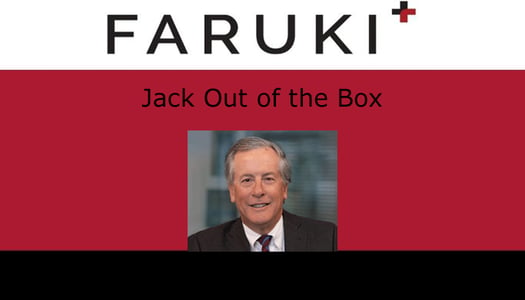- August 21, 2024
- Jack Greiner
- Jack Out of the Box
 The Ohio Supreme Court recently decided that a libel plaintiff could bring a lawsuit well beyond the expiration of the one-year statute of limitations if the plaintiff didn't know about the libel until after the statute had run. According to the Chief Justice's dissenting opinion, this is "judicial activism" in its clearest form.
The Ohio Supreme Court recently decided that a libel plaintiff could bring a lawsuit well beyond the expiration of the one-year statute of limitations if the plaintiff didn't know about the libel until after the statute had run. According to the Chief Justice's dissenting opinion, this is "judicial activism" in its clearest form.
The case involves a dispute between a Cincinnati base real estate developer named Christopher Hildebrant, and Thomas Weidman, a Sycamore Township Trustee. In the course of facilitating a sale of property owned by SDI Foods to Sycamore Township, Hildebrant alleged that Weidman demanded a kickback. Hildebrant went so far as to create a fictitious email account with the address tweidman12@gmail.com and sent an email from that account to himself on December 20, 2011. The email portrayed Weidman as having accepted an illicit payment from Hildebrant and demanding more payments in exchange for his support in another real-estate transaction.
In 2019, Hildebrant sought to purchase a parcel of land owned by Sycamore Township on behalf of his development group. The parcel purchase required unanimous consent by the Sycamore Township Board of Trustees, on which Weidman still served. Weidman opposed the sale of the parcel of land. On January 25, 2020, Hildebrant met with Sycamore Township Trustee James LaBarbara and Sycamore Township Administrator Raymond Warrick to discuss the parcel purchase. During the meeting, Hildebrant asserted that Weidman's opposition to the sale was in retaliation for Hildebrant's failure to pay Weidman a kickback from the SDI Foods transaction in 2011 and Hildebrant showed the 2011 email to LaBarbara and Warrick. This prompted the state auditor to launch an investigation, and as part of that investigation, Weidman learned of the 2011 memo on November 18, 2020.
Weidman filed suit for libel on February 17, 2021. Hildebrant asked the court to dismiss the case because it was filed after the one-year statute of limitations ran. Hildebrant argued that whether the court used the December 2011 date or the January 25, 2020, the one-year statute had expired by the time Weidman filed his suit. But Weidman argued that the statute of limitations didn't begin to run until he "discovered" the existence of the memo on November 18, 2020.
The majority opinion, authored by Justice Michael Donnelly, concluded that because Hildebrant has purposely kept the memo's existence secret, the "discovery rule" should apply as an exception to the statute of limitations. "the delay in reputational harm was not due to an inherent latency but, rather, to intentional conduct by Hildebrant to use secret communications to allegedly defame Weidman. If the cause of action for a defamation claim accrued upon the publication of the defamatory statements, a tortfeasor could conceal that publication until the statute of-limitations period had expired. This would mean that a tortfeasor could secretly publish defamatory statements without concern that the defamed person would be able to seek recourse."
Chief Justice Sharon Kennedy, however, dissented, because she believes the Ohio legislature plainly established that the statute accrued from the date of publication, and only the legislature should make up exceptions. As she noted, "[t]he majority takes the judicially created 'discovery rule,' which has been narrowly applied in bodily injury, medical-malpractice, and actual-economic-loss cases, and expands its application to defamation cases. By holding that the date of publication does not control when a defamation cause of action accrues, the majority's decision 'thrust[s] the judiciary into the role of law maker.'"
It's an interesting debate, but I'm not sure the facts of this case required such an expansive ruling. Hildebrant "published" the 2011 email on January 25, 2020, when he shared it with LaBarbara and Warrick. Weidman learned of that publication on November 18, 2020, within the one-year statute of limitations. He had ample time to file within the one-year period from January 25, 2020. He waited until February 17, 2021, to file his lawsuit. I'm not sure why the Supreme Court let him off the hook.
